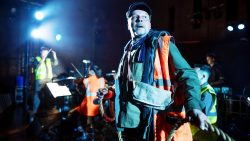 THE opening bars of Richard Wagner’s opera The Flying Dutchman rank amongst the most immediately recognised musical themes in operatic music. Like so much of the composer’s work, it bursts upon you with ferocity of a shell fired from a Schwerer Gustav cannon.
THE opening bars of Richard Wagner’s opera The Flying Dutchman rank amongst the most immediately recognised musical themes in operatic music. Like so much of the composer’s work, it bursts upon you with ferocity of a shell fired from a Schwerer Gustav cannon.
But Wagner’s telling of the legendary tale (he wrote the words as well as the music) of a sailor doomed to sail the seas forever, never finding landfall, as the result of making a pact with the Devil after praying for help and safe-keeping during a life-threatening storm when rounding the Cape of Good Hope, is anything but crash-bang with no subtlety. A favourite theme of Wagner’s is that redemption can always be found through love, and Glyn Maxwell and Laura Bowler who have taken Lucy Bradley’s original concept of the opera and re-imagined it, are well aware of the necessity to maintain the poignancy and quiet amid the big, almost overwhelming sweep of the story.
The score is arranged for eight musicians of the Manchester Camerata and sung by four principles and a limited ensemble, all firmly and unobtrusively under the control of conductor Tim Burke, the scene was set to bring this true Grand Opera to the very limited spaces of Great Eastern Hall. This small, square building usually houses exhibitions connected with Isambard Kingdom Brunel, whose great ship the SS Great Britain is anchored across the yard. The venue offered very little help for director Lucy Bradley to make the transition from grand to chamber opera.
Undeterred by the challenge, Lucy showed great imagination, happily at times allowing the singers to mingle with the musicians, bringing the characters in this modern version of the story alive. The Flying Dutchman is now a mariner people-smuggler, attempting to come to terms with those who have met their death whilst in his keep. The Pandora-like Starlight, who befriends him, has so much love for him that she is prepared to give up her life in order to offer him redemption. Showing great concentration, playing to an audience all but sitting in their laps, Paul Putnins and Philippa Boye created two characters who looked completely at home and utterly believable in this contemporary setting.
Philippa was equally comfortable fighting a lengthy vocal battle with Carolyn Holt, who, with the minimum of physical changes and great vocal dexterity, moved from the fierce defender of our shores Mari, determined to apprehend the Mariner, to the frothy, easy-going cable laying crew member Helm. Rounding off this well-balanced vocal team was Timothy Dawkins as the cable-laying, and easily bribed Captain Dee.
The Great Eastern Hall proved to have a good acoustic, which helped the company to produce a very acceptable musical and vocal evening. There were however moments when Wagner’s grand score, even when arranged, played and sung, as well as this, and the big sweeping themes of the story, needed a bigger and grander setting and presentation to be fully effective.
The Flying Dutchman now sets off on a nationwide tour, leaving behind nice enough memories to hope the company will soon return to the venue with another chamber opera offering.
GRP